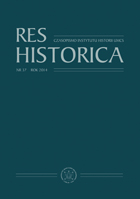Dom Pracy Przymusowej Związku Międzykomunalnego Opieki Społecznej i Zdrowia Publicznego Województwa Warszawskiego w Oryszewie jako instytucja opieki zamkniętej dla ograniczania zjawisk żebractwa i włóczęgostwa w Warszawie w latach 1932–1939 (w świetl
Forced Labor Home of the Intercommunal Union for Social Welfare and Public Health of the Warsaw Province in Oryszewo as a Closed Care Institution for Reducing the Phenomena of Begging and Vagrancy in Warsaw in the Years 1932–1939 (in the Light of Pre
Author(s): Alicja GontarekSubject(s): Social history, Welfare services, Interwar Period (1920 - 1939), Ethnic Minorities Studies
Published by: Wydawnictwo Naukowe Uniwersytetu Marii Curie-Sklodowskiej
Keywords: begging; forced labor; house of forced labor; Roma people; Warsaw; vagrancy;
Summary/Abstract: Forced Labor Houses in the Second Republic were closed-type institutions. By a decision of the legislature in 1927, they served, using the language of the time, to combat begging and vagrancy through preventive (protective) measures, rather than proper punitive ones. However, only four such facilities were established between the wars, due to the prohibitively high cost of maintaining such facilities. Their operation was handled by municipal associations, which received state funding. Established in 1932, the modern Forced Labor House in Oryszew, based on Belgian models, was the fi rst such institution in the former Russian partition established by the Intercommunal Union for Social Welfare and Public Health of the Warsaw Province. Although it did not play a key role in reducing the phenomena of begging and vagrancy in the capital, in a system of establishments aimed at helping representatives of the social margins, its role was gaining importance, and this initiative should be appreciated. Between 20 and 30 percent of those captured by the police in Warsaw and subsequently tried by municipal courts were sent to it. These were mainly parochial individuals, not professional beggars or vagrants. While the campaign to forcibly remove representatives of the social margins from the streets of Warsaw succeeded, thanks in part to the Oryszewski workhouse, the correctional and rehabilitation goal was not achieved.
Journal: Res Historica
- Issue Year: 2023
- Issue No: 56
- Page Range: 601-630
- Page Count: 30
- Language: Polish

